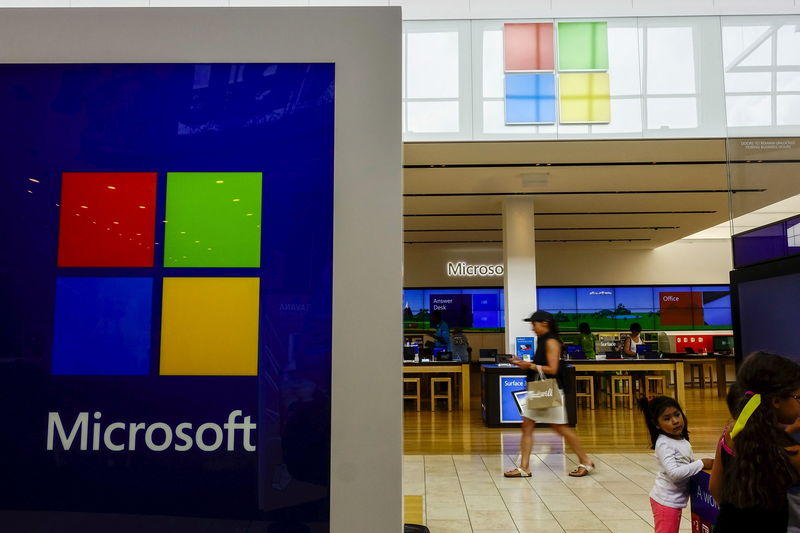Investing.com -- Tech giants Microsoft and Alphabet (NASDAQ:GOOGL) lead the earnings slate later in the session Tuesday, while Bitcoin soared in anticipation of the approval of an ETF in the U.S.. European PMI data pointed to a region heading towards recession, offering the potential for downside surprises in the U.S. equivalent.
1. Microsoft and Alphabet lead earnings deluge
The week’s deluge of major tech earnings starts later Tuesday, with results due from both Microsoft and Google-parent Alphabet after the closing bell.
Microsoft (NASDAQ:MSFT) is expected to report earnings per share of $2.65 on revenue of $54.5 billion, and investors will be looking more for updates since it closed its deal for Activision Blizzard (NASDAQ:ATVI).
There will also be a big focus on whether the software giant’s big bet on artificial intelligence is paying off at its cloud-computing unit.
Microsoft announced on Monday that it will spend A$5 billion ($3.2 billion) expanding its artificial intelligence and cloud computing abilities in Australia over two years.
Alphabet (NASDAQ:GOOG) is expected to offer up earnings of $1.45 a share on revenue of $75.9 billion, with investors looking for fresh evidence on the current state of the digital advertising environment.
Alphabet is likely to benefit from its strong cloud division, adding substantial revenue growth, while expanding data centers will continue to bolster its presence in the cloud space.
2. Wall Street opens higher ahead of key tech earnings
U.S. stock indices edged higher Tuesday, with investors focusing on earnings reports from a number of the very influential tech companies.
The major indices traded in a mixed fashion on Monday, as the benchmark 10-year U.S. Treasury yield traded above the closely followed 5% level before falling back. The broad-based S&P 500 fell 0.2% and the blue chip Dow Jones Industrial Average fell 0.6%, while the tech-heavy Nasdaq Composite rose 0.3%.
Federal Reserve officials have suggested in recent days that higher bond yields could have the same effect as interest rate increases in helping to cool the economy, and the central bank is widely expected to hold rates steady next week.
The earnings season kicks into top gear this week, with around 30% of S&P 500 companies slated to report.
Earnings due from tech giants Microsoft and Alphabet [see above] are the highlight of today’s session [see above], but there are also numbers from the likes of Coca-Cola (NYSE:KO), Spotify (NYSE:SPOT) and General Motors (NYSE:GM) to study.
About 17% of S&P 500 companies have already reported earnings, and three-quarters of them have posted earnings surpassing analysts’ expectations, according to FactSet.
3. Bitcoin soars on ETF speculation
Bitcoin (BitfinexUSD), the largest cryptocurrency by market capitalization, continued to surge in early trade Tuesday on speculation that an exchange-traded Bitcoin fund is imminent.
It surged 10% on Monday in its best session for almost a year and its price has doubled in 2023.
The U.S. Securities and Exchange Commission has been very slow in accepting Bitcoin ETF (TSX:EBIT) applications, but speculation is growing that approval is coming after a court ruling that the regulator had been wrong to reject an ETF application from Grayscale Investments.
Numerous reports have emerged this month indicating that the SEC, the country’s gatekeeper, won't appeal the ruling.
Trillions of dollars in institutional money are waiting to enter Bitcoin once an ETF is approved, according to Ernst & Young’s global blockchain leader Paul Brody, in an interview on Monday.
“Any of these other institutional funds, they can’t touch this stuff unless it’s an ETF or some other kind of regulatory blessed activity,” he said.
4. PMI data point to economic slowdown
The economic data slate centers around the release of flash PMIs in Europe and the United States, which will provide clues on the economic picture ahead of the European Central Bank’s policy-setting meeting later this week, and then the Federal Reserve’s get together next week.
The U.S. composite Purchasing Managers' Index came in at 50.2 in September, suggesting economic growth largely stagnated. With crude prices rising since then, growth could slow as we head into the fourth quarter.
The news from Europe wasn’t encouraging, as business activity in Germany, the eurozone’s dominant economy, contracted for a fourth straight month in October, suggesting a recession is well underway.
The German composite PMI fell to 45.8 in October from September's 46.4, below the 50 level that points to a contraction in business activity.
There was a similar story with the data for the eurozone as a whole, with the region’s composite PMI falling to 46.5 in October, down from 47.2 the prior month.
This was the lowest reading since November 2020, and outside of the COVID-19 pandemic months it was the weakest since March 2013.
5. Crude edges lower with Gaza in spotlight
Crude prices edged lower Tuesday, handing back early gains as traders continued to fixate on developments in the Israel-Hamas war and the potential wider conflict in this important oil-exporting region.
The benchmarks tumbled around 3% on Monday as a series of diplomatic missions to Israel and Gaza pushed up hopes over a deescalation in the conflict. This was also accompanied by Hamas agreeing to free some hostages.
However, Israel continued its bombardment of Gaza on Monday, and the situation remains highly fluid with the market seemingly divided over whether the conflict will continue to ease from here or flare up again.
The American Petroleum Institute industry group releases its latest estimate of U.S. inventories later in the session, and crude stockpiles were expected to have risen last week, while distillate and gasoline inventories fell.
The official data from the Energy Information Administration, the statistical arm of the U.S. Department of Energy, is due on Wednesday.
